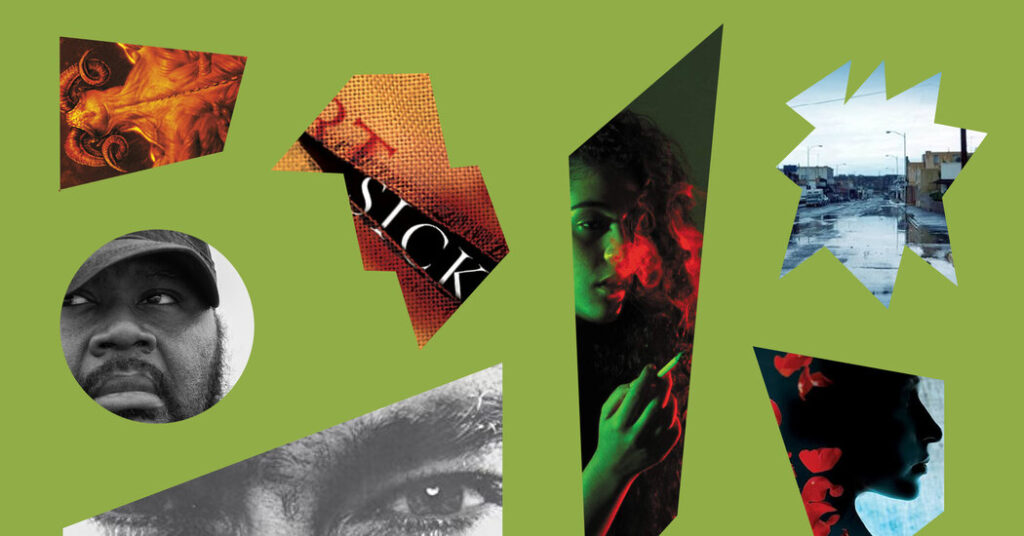I think every crime and mystery writer has four types of novels they will inevitably write in their career: a murder mystery, a heist novel, a novel of revenge — and a serial killer novel.
Serial killers are our modern-day boogeymen (and women). They have replaced the vampire, the werewolf and even the ghost as the harbingers of doom and the avatars of societal degradation. The serial killer is the Red Death wearing the mask of civility and friendship. They are the Other, disrupting the masquerade of order that we collectively agree to maintain.
They are the all-too-human monsters that wait for us in the dark.
For me, serial killers are a fascinating subject to write and to read about. Through their abominable acts, we see a twisted fun-house reflection of what we could become as a society — or what we already are. Here, in no particular order, are six of my favorites.
By Ivy Pochoda
First, we have a serial killer novel where the killer is the least interesting part.
In “These Women,” Pochoda takes us into the hearts and minds of the people who must face the evil of a pathetic, venal, disturbed man and shows us their strength and the deep reservoirs of their resolve. Told through the eyes of six vastly different but hauntingly complex women in Los Angeles, this book succeeds where a lot of serial killer novels fail: remembering the people who survived. Published in 2020, it is a fearless, simmering hot stiletto of a novel, and an instant classic.
By Chelsea Cain
Archie Sheridan, a police detective, spent years chasing one of the most deranged and vicious serial killers to ever appear in the pages of a book, the beautiful and completely insane Gretchen Lowell. After a decade of cat-and-mouse, Gretchen caught Archie and tortured him for 10 days before mysteriously letting him go and turning herself in to the authorities. Now, a new killer is terrorizing the Pacific Northwest, and Archie must consult the best expert on killers that he knows: his one-time foe. But Gretchen seemed to know that Archie would be visiting her long before the new monster made its presence felt.
Inverting the usual investigator-killer dynamic, “Heartsick” is a dark and moody examination of obsession and trauma that never takes its foot off the gas.
By Dennis Lehane
During a long, brutal Massachusetts winter, the private detectives Patrick Kenzie and Angie Gennaro are hired to protect the son of a well-known psychiatrist. But what starts out as an easy payday soon becomes an unsettling journey into the deepest pits of human depravity.
A horror novel couched inside a searing mystery, “Darkness, Take My Hand” is by turns terrifying, moving and ultimately — as impossible as it may sound — hopeful. It is an example of a writer at the peak of his powers, creating suspense out of such mundane details as a song playing on a jukebox. Lehane stares into the abyss and dares to transcribe what he sees without blinking or turning away. He forces us to confront the worst humanity has to offer — while also showing us at our best.
By Jennifer Hillier
Fourteen years ago, a teenage Georgina Shaw helped her then-boyfriend Calvin James dispose of the body of her best friend, Angela Wong. Georgina went on to become a fast-rising executive. Calvin went on to become a serial killer. Now, Angie’s remains have been found and Georgina’s terrible secret has been exposed to the world.
But there are darker secrets yet to come.
Using the serial killer as a metaphor for trauma has rarely been done with more panache. This novel takes us on a journey of regret and redemption and dares to ask: What kind of person were you before you became who you are now?
By Jim Thompson
From the outside, Lou Ford seems to be every bit the easygoing, aw-shucks deputy sheriff of a small Texas town. But that is just the facade he has created to mask the boundless and bloody black hole of degeneracy that rages within him. Lou is a deeply twisted profligate sadist: While not technically a serial killer, he abuses the people in his town with wild abandon, building to one of the most visceral descents into madness in modern fiction.
“The Killer Inside Me” is crime fiction as philosophical dialogue. Lou presents the face of every killer who is described by his friends and neighbors as “a nice, quiet guy.” But in that quiet, madness reigns.
By Thomas Harris
Will Graham is not the toughest detective ever to hunt human monsters. He might not even be the smartest. But he’s without a doubt the best, because he does what no one else has the ability to do: put himself in the minds of the worst people to ever walk the earth.
Years after catching and almost being killed by Hannibal Lecter, Will is living a serene life on the Florida coast, working on motorboats and watching the postcard-perfect sunrise every morning. Then his old boss Jack Crawford comes with news that both troubles and excites Will: A new killer is on the prowl, and he may have a connection to Lecter.
In the years since this novel was released, popular culture has fallen in love with the urbane, suave and sophisticated version of Lecter that lives in our zeitgeist. But in “Red Dragon,” Harris never lets us forget that Lecter is a monster — intelligent and cunning, yes, but also repugnant and insane. Will is blessed and cursed with the ability to inhabit that insanity. The price for that skill may be his soul.


